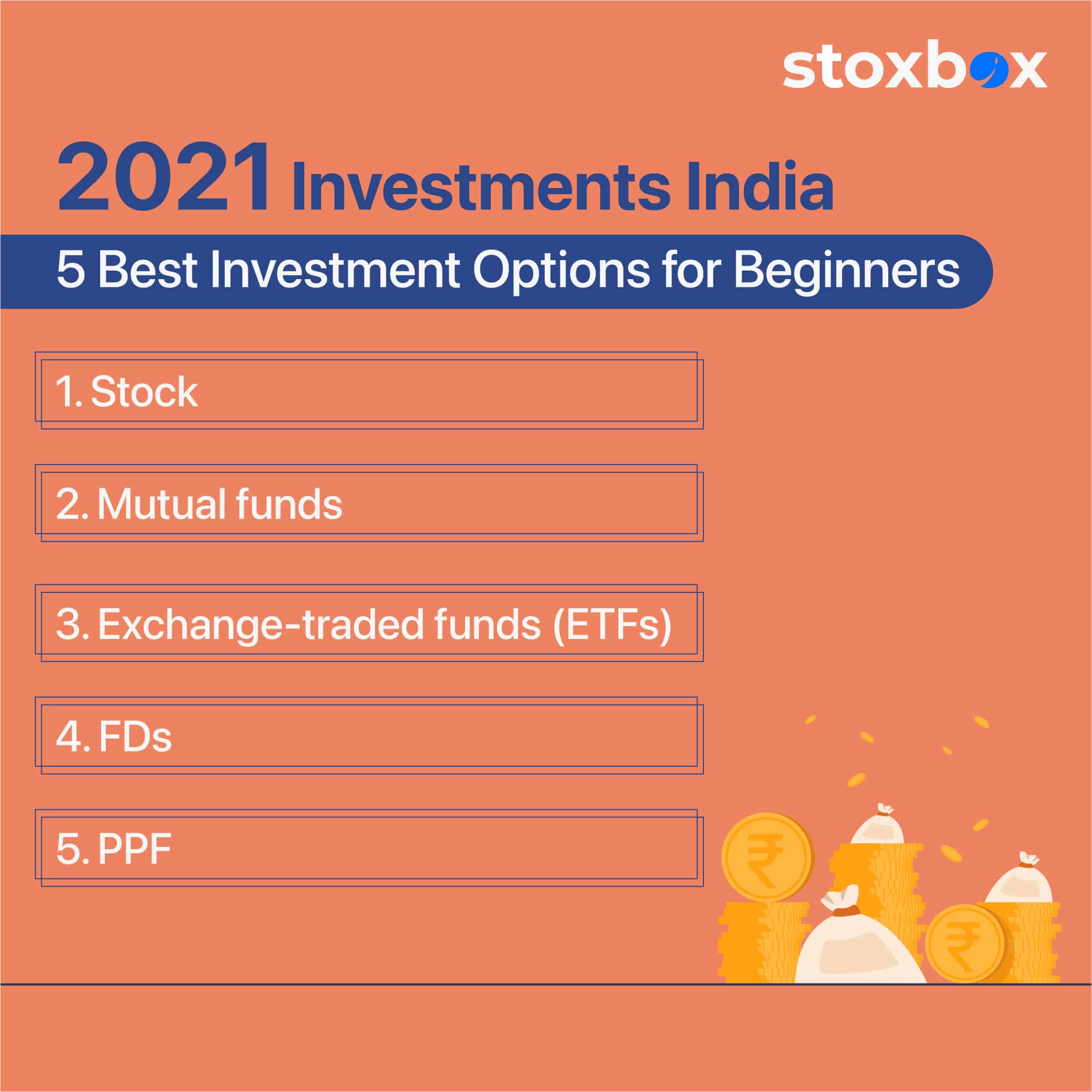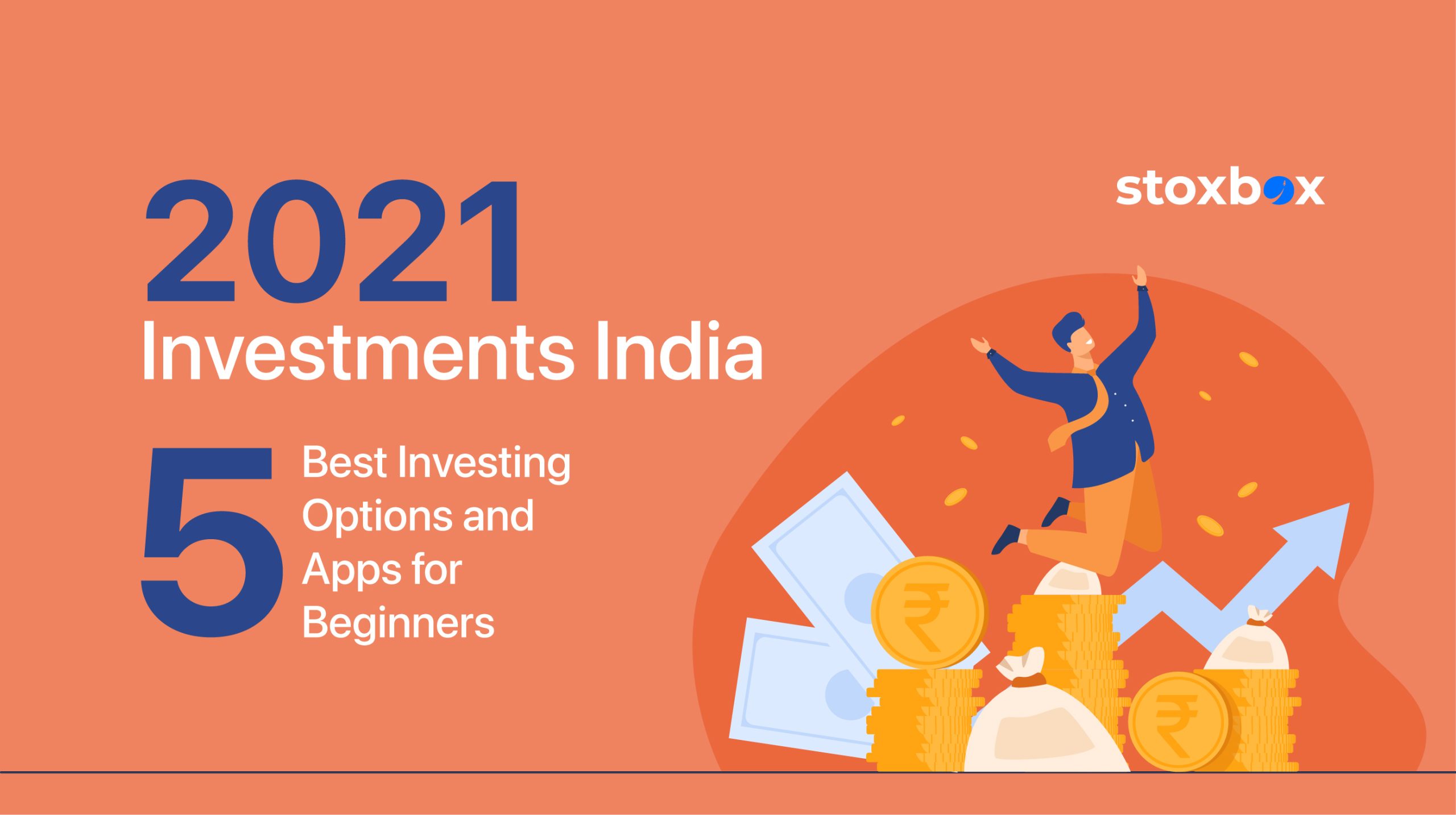The year 2021 is looking good, with the markets seeing profitable growth and the economy slowly recovering from the pandemic’s effect. It is, therefore, time to create a financial portfolio and invest in different investment avenues.
When it comes to investment avenues, there are different types of investments that you can choose from. Have you decided which avenues are right for you?
If you have not, don’t worry. Here’s a quick look at the best investment options in India that you can pick to save your hard-earned money.
2021 Investments India—5 Best Investment Options for Beginners

1.Stock
The stock market is the first avenue that usually springs to mind when you are looking to make the maximum returns. After all, the stock market is quite a lucrative investment platform in India, isn’t it?
Stocks allow you to grow your wealth through attractive returns. You can either choose to invest once and let your investments grow or trade actively through intra-day trading. The choice is yours. However, when you invest in the stock market with a long-term perspective, the return potential is high.
A word of caution—though—remember that stock investing is fraught with risks. So, you need to look out for the possible risks and be careful when choosing any particular stock.
(Here are some rules of trading in the stock market.)
Don’t hurry when investing in the stock market. Research about the stock, take expert help and then start. Here is a quick stock market guide for a ready reckoner if you need it.
If you want a readymade portfolio to start your journey, StoxBox can prove helpful. You would get a portfolio of investments selected based on quantitative, qualitative, and fundamental analysis by experts. Moreover, StoxBoxes are professionally managed avenues, allowing you to leave your investments in expert hands that understand the markets. A better alternative, don’t you think?
2.Mutual funds
Mutual funds are another popular avenue that gives you the benefit of diversification. Under mutual funds, various investors pool their investments into a corpus. This corpus is then invested in different types of securities by experienced fund managers.
There are different types of mutual fund schemes so that you can invest as per your risk appetite and investment need.
There are different investment modes, also. You can either invest at once or choose the systematic manner of investing through systematic investment plans (SIPs).
For getting tax benefits, you can choose Equity Linked Saving Schemes (ELSS). ELSS would give you a tax deduction on the money that you invest. This deduction is available under Section 80C of the Income Tax Act, 1961, up to Rs. 1.5 lakhs. Interesting, isn’t it?
3.Exchange-traded funds (ETFs)
ETFs give you the best of both worlds, i.e., stocks and mutual funds. Like stocks, they are listed on the stock exchange and can be actively traded. Like mutual funds, ETFs pool money from different investors and then invest the pooled corpus in different types of tradable assets like stocks, derivatives, gold, etc. ETFs are, usually, passively managed funds that track the performance of a particular index or the price movement of the underlying asset. So, if you want both stock- and mutual fund-type investing, ETFs can be your go-to solution!
4.FDs
FDs or fixed deposits are one of the most popular investment avenues among many investors. You can open a fixed deposit account with a bank or an NBFC (non-banking financial company). You have the flexibility to choose the amount that you want to deposit and the tenure. Depending on these two factors, the interest rate is fixed. If you are a senior citizen, you can get an additional interest on your deposit.
5-year fixed deposit schemes, offered by banks, give you deduction under Section 80C of the Income Tax Act, 1961. The amount that you deposit is allowed as a deduction of up to Rs.1.5 lakhs. However, the interest that you earn on FDs is taxable in your hands. Tax would be applicable at your tax slab rate. Senior citizens, however, can enjoy tax-free returns up to Rs. 50,000 under Section 80TTB of the Income Tax Act, 1961. Thus, compared to equity investments, where tax depends on the holding period, FD interests are taxed irrespective of the FD tenure.
5.PPF
Short for Public Provident Fund, PPF is another safe investment with a term of 15 years, extendable by another 5 years. The interest on the PPF account is fixed so that you don’t have to worry about market volatility.
PPF investments also qualify for tax deduction under Section 80C of the Income Tax Act, 1961. The investment made into the PPF Account is allowed as a deduction up to a limit of Rs. 1.5 lakhs. Moreover, the interest earned and the redemption proceeds are also completely tax-free, making PPF an EEE (Exempt, Exempt, Exempt) investment avenue.
So, if tax-saving is your primary objective, you can pick PPF schemes.
Which of these avenues excite you?
Don’t rush, though. Explore these options and then choose those that suit your investment needs, horizon, financial goals, and risk appetite. Diversify your financial portfolio with a healthy mix of assets. Why choose one when you can have it all?
Diversify and cut down on the risks while enjoying good returns!
2021 Investments India—Best Stocks to Buy
Coming back to stocks, if equity is what attracts you, be sure to pick the best. As a beginner, the best stocks would help in avoiding losses, and you can also learn the trick of the trade with hands-on experience. So, here are some best stocks that you can pick in 2021:
- Stocks of established companies like Reliance Industries, HDFC Bank, Bharti Airtel, etc.
- Mutibagger stocks like Adani Gas, IRCTC, Trent, etc.
- Pharmaceutical stocks like Sun Pharmaceuticals, Dr. Reddy’s, etc.
To invest in the stock market, research and monitor the stocks that you pick. Start small, and then learn your way up the ladder.
You can also choose StoxBox and invest in a plethora of stocks. You can get a ready-made basket of stocks, which would give you a diversified portfolio as well as attractive returns. StoxBox is expertly managed based on strong fundamentals, and stocks are picked based on different factors and time horizons of investment. It works on the principle of thematic investing and uses intensive machine learning and professional research to handpick the best stocks using advanced technology.
2021 Investments India—Best Investment Apps

Mobile applications have made investments a breeze. Now you can do everything on your mobile, and that too, on the go! So, here are some best money and investment apps for hassle-free money management and investment:
- Wallet
This app helps you manage and track your money most effectively. You can link all your bank accounts on the app and track your spending and incomes. You can plan for your goals and also manage your debt through the app.
- Monefy
Monefy is a budgeting app that segregates your expenses into 15 different and relevant heads for better clarity. You can check your income and expenditures in a graphical format for a quick understanding of your budget.
- Walnut
Another money management app, Walnut, also doubles up as a loan provider. You can avail yourself of personal loans through the app while tracking your incomes and expenses.
- Robinhood
The most popular investment app in the US, Robinhood allows you to invest without any commission. You can invest, track your investments, and also create a diversified portfolio through the app.
- BPWealth App
A leading investment app in India, the BPWealth app allows you to trade in stocks on a real-time basis. You can download the app on your smartphone and start stock trading instantly without any hassles. You also get the benefit of thematic investing through StoxBox through this app.
The Final Word
The year 2021 has started on a positive note. Use these investment ideas and apps to find where to invest money and invest confidently. There are various avenues to pick. Assess what you need and then pick. If the markets attract you, go for stocks, mutual funds or ETFs. FDs and PPFs would be the right choice for the more conservative investors with limited exposure to stocks. So, make an informed choice. After all, it’s your money that we are talking about, isn’t it?
You might also Like.
No posts found!
